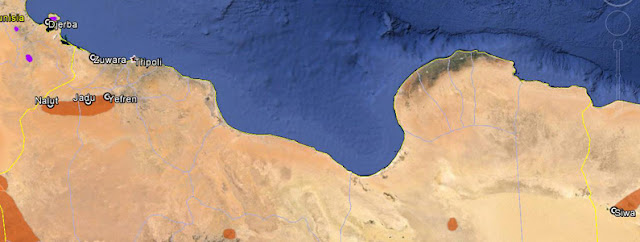Lebanon's cities and villages,
tragically now in the news, have some interesting etymologies. I always used to wonder about the different names: why is the same city called Tyre in English, but
Ṣuur in Arabic? or Byblos in English, and
Jubayl in Arabic? The reasons illustrate the sheer length of these towns' history, and the time depth of Greece's contact with them.
Sometime before the characteristic sound shifts of Proto-Canaanite happened - perhaps 1200 BC or so? - Tyre would have been known by a Semitic term meaning something like "peak" or "crag":
θ'uur-u. This was borrowed by the early Greeks as
tur-os >
tyros (when u got fronted to y) > Latin
Tyrus > English Tyre. Meanwhile, in Lebanon, that glottalised θ', perhaps unsurprisingly, was among the first sounds to disappear; in Canaanite (that is, Phoenician, Hebrew, and assorted minor languages of the area), it became s' (or ṣ - it's hard to be certain whether the Canaanite emphatics were glottalised or pharyngealised). Case endings also vanished. This gave the Phoenician name:
S'uur (or
Ṣuur). It was adopted without change into Aramaic, and thence Arabic, as the region's languages shifted over time. The regular cognate of Proto-Semitic
θ'uur-u in Arabic would have been ظور
đ̣uur; this root is unattested as far as I know. However, in Aramaic *θ' became ṭ, and from this source the root entered pre-Arabic as طور
ṭuur "mountain", a rare but well-attested term used in the Quran, notably for Mount Sinai. (In Ugaritic, freakishly enough, *θ' became γ (gh), and
γuur- "mountain" is a well-attested Ugaritic word. In Ugaritic, incidentally, Tyre was actually called
ṣuur-; so either my etymology here is wrong, which is possible, or Ugaritic borrowed the name after it had already changed *θ' to γ.)
Likewise, Byblos would have started out as
gubl-u (attested in Ugaritic and Akkadian), which (judging by possible Arabic cognates) may have meant "mountain" as well. This went into early Greek as
gwubl-os >
byblos (Mycenaean gw > Greek b, u > y) > English
Byblos. In Arabic, the g of course became j; and, for some reason (maybe it was a little town at the time?), it looks like a diminutive got added, turning it from
*jubl to
jubayl (colloquial
žbeyl), which in Arabic just means "little mountain".
Let's hope the day that these towns appear on the news for their
history or their
beaches, not for the bombs being dropped on them, comes
more quickly than looks likely.

